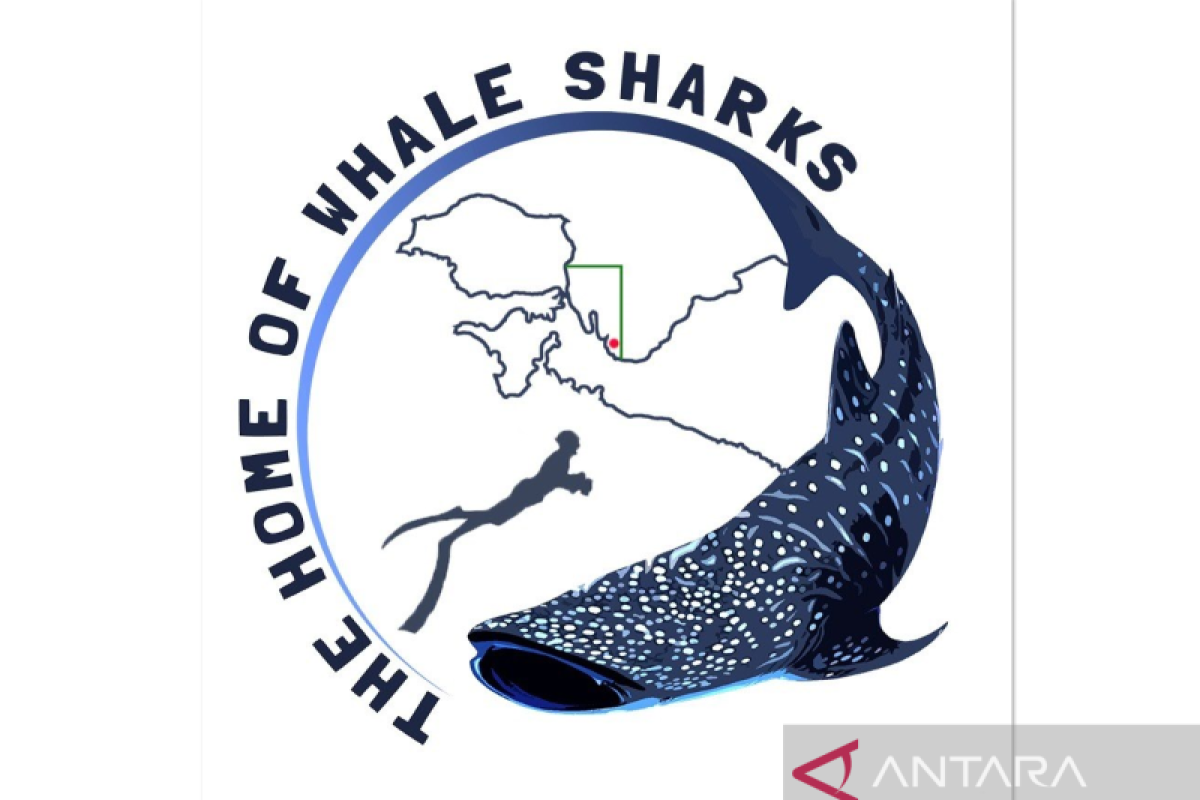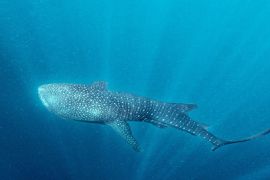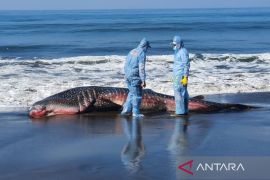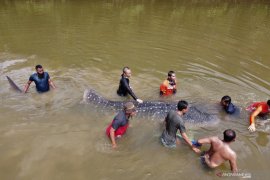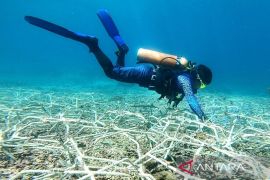Of the 117 species, the whale shark (Rhincodon typus) is the only shark species whose status has been set as fully protected since 2013 through the Decree of the Minister of Marine Affairs and Fisheries Number 18/KEPMEN-KP/2013.
Whale sharks feed on plankton and are the largest fish species on the planet.
They are currently included in Appendix II of the Convention on International Trade in Endangered Species (CITES). According to the CITES website, species listed in Appendix II are not necessarily threatened with extinction currently, but may become so unless their trade is controlled closely.
Whale sharks have also been categorized as vulnerable by the International Union for Conservation of Nature (IUCN).
In Indonesia, there are reports of whale sharks getting stranded on beaches or entangled in fishers' nets almost every year.
The country is on one of the migration routes for whale sharks, which is proven by the frequent sightings of the fish species in several parts of Indonesian waters, such as in the waters of Sabang (Aceh), Berau (East Kalimantan), Situbondo (East Java), Bali, Nusa Tenggara, Alor and Flores (East Nusa Tenggara), North Sulawesi, Maluku, and Papua.
Throughout the year, whale sharks can be found around Kwatisore, Papua, with their population projected to be around 27–41.
The Indonesian Institute of Sciences (LIPI) also recommended the full protection of whale sharks through Letter 2425/IPH.1/KS.02/X/2012 issued on October 12, 2012.
The recommendation states that whale sharks meet the criteria as a fish that needs to be fully protected, in accordance with Government Regulation Number 60 of 2007 concerning the Conservation of Fish Resources
National action
The Decree of the Minister of Marine Affairs and Fisheries Number 16 of 2021 concerning the National Action Plan for Whale Shark Conservation for 2021–2025 was issued to synergize the management of whale sharks.
The decree was signed by Marine Affairs and Fisheries Minister Sakti Wahyu Trenggono on March 1, 2021, and was launched at the 3rd Indonesian Shark and Ray Symposium in Jakarta on April 7 the same year.
The National Action Plan for Whale Shark Conservation was made a reference for work units within the ministry and related agencies in implementing whale shark conservation, in accordance with their respective duties and functions.
The whale shark conservation strategy and action plan is significant since a protected status is not enough, rather sustainable, planned, and measurable efforts are required to conserve the species.
It is expected that the action plan will not only become a document for planning, but will also be implemented seriously by all parties, especially by agencies that are in charge of whale shark conservation.
In this regard, the Ministry of Marine Affairs and Fisheries has been evaluating the implementation of the action plan every year.
The action plan contains strategies, activities, indicators, output, location, time, persons in charge, and related work units for whale shark conservation in Indonesia.
In line with the efforts of the Ministry of Marine Affairs and Fisheries, the Ministry of Environment and Forestry, through the Cenderawasih Bay National Park Agency (BBTNTC), and state-run oil and gas company PT Pertamina, through Pertamina Foundation (PF), have agreed to collaborate in the management of the Whale Shark Center (WSC).
On August 30, 2023, coinciding with International Whale Shark Day, a cooperation agreement was signed between BBTNTC and PF in Jakarta.
The collaboration between BBTNTC and PF is deemed important in efforts to conserve whale sharks.
It is expected to improve the economy of the community living inside and around the Cenderawasih Bay National Park area.
The cooperation is also expected to encourage domestic and foreign researchers to come and jointly conduct whale shark research in Indonesia.
In this sense, the cooperation has come as real proof of strong collaboration in preserving nature.
The Cenderawasih Bay National Park is one of the locations of whale shark aggregation in Indonesia. Thus, the condition of the national park's natural resources and ecosystems needs to continue to be maintained for the lives of flora, fauna, and communities that depend on the national park.
The authorities at the Cenderawasih Bay National Park have been consistently monitoring the population of whale sharks since 2011 to identify them, including their sex, body structure, and population distribution.
As of August 2023, as many as 188 whale sharks have been identified, comprising 165 male whale sharks and 6 female whale sharks. Meanwhile, the sex of 17 whale sharks has not been determined.
The cooperation between BBTNTC and PF covers several matters regarding strengthening the area functions and biodiversity conservation through WSC management support.
The activities carried out under the cooperation include WSC development, community empowerment and improvement of awareness on whale shark protection, scientific research, and monitoring of the whale shark population in the Cenderawasih Bay National Park.
However, there are several factors that are affecting the tagging of whale sharks.
One of the obstacles is the high cost of whale shark tagging, including the costs of developing, purchasing, and installing tagging devices, as well as remote monitoring. Nevertheless, it is hoped that limited resources will not hinder the smooth running of monitoring.
To this end, cooperation with PF is essential to continue the whale shark tagging efforts.
The Cenderawasih Bay National Park was established based on the Decree of the Minister of Forestry Number 8009/Kpts-II/2002 dated August 29, 2002, concerning the Establishment of the Cenderawasih Bay National Park as a marine conservation area. It covers an area of 1,453,500 hectares.
One of the mandates given to the national park is saving 7 key and priority species, namely Nicobar pigeons, horse oysters, whale sharks, dugongs, dolphins, tridacna, and sea turtles.
Through the joint cooperation of several parties, including the government, it is expected that whale sharks can be saved.
Related news: Shark fishing ban in Raja Ampat continues to be violated
Related news: Botubarani whale shark attraction cleaned up from waste
Editor: Rahmad Nasution
Copyright © ANTARA 2023
